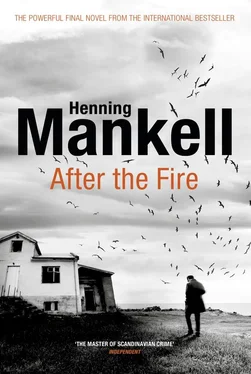He lay there like a wounded animal, clutching his left leg. You didn’t have to be a doctor to see that the leg was broken between the ankle and the knee.
Louise had heard his scream and came running up from the caravan. Hasse, who was sitting in the boat, also realised that something had happened. We gathered around Myllgren, who was struggling to cope. If my house hadn’t burned down I would immediately have given him a pain-killing injection, but as it was I could offer him only tablets. He was very pale, and made me think of a soldier in a trench who has been shot and can feel the life seeping out of him.
‘You’ve broken your leg,’ I said. ‘You need to go to hospital.’
‘We’ll carry him down to the boat,’ Hasse said, who clearly didn’t grasp the severity of the situation.
‘The coastguard will have to come and pick him up,’ I said. ‘If we carry him without a stretcher, we could make things even worse.’
I asked Louise to fetch a blanket.
‘You’ll have to move your boat,’ I said to Hasse. ‘Otherwise the coastguard won’t be able to get in.’
He opened his mouth to protest, but I raised my hand and pointed to the jetty. He decided to cooperate. I called the coastguard, then crouched down next to Myllgren. He was so young, and I was impressed by his determination not to give in to the agonising pain.
The coastguards arrived in less than half an hour. They put Myllgren on a stretcher and carried him down to their boat. Alexandersson was in charge; he was an experienced man who had carried many stretchers in his life.
Hasse had moved his boat, which was drifting just off the jetty. When Myllgren was safely on board, Alexandersson turned to me.
‘I was buying paint yesterday,’ he said. ‘Maggan asked about you. She said your boots had arrived. She’s going to run the chandlery now that Nordin is gone — for a while anyway, until his brother takes over.’
I knew that Nordin’s brother was a plumber. Perhaps he would make a good job of running the shop?
Alexandersson stepped aboard, and the boat reversed out. Hasse followed in his white Drabant II once the coastguard had rounded the headland.
‘My wellington boots have arrived,’ I said to Louise, who was sitting on the bench.
‘In that case we can pick them up tomorrow. We need to do some food shopping anyway.’
I heard Alexandersson turn the engine up to full throttle, the dull roar bouncing off the rocks of the islands and skerries.
I felt sorry for Myllgren, but at the same time I was glad my wellington boots had arrived.
The wellington boots didn’t fit.
Nordin’s wife Margareta was considerably bigger than I remembered. She must be suffering from some kind of disease. No one can get that fat just through overeating. She could hardly make her way between the shelves and counters in the shop. When I walked in she was contemplating a display of landing nets. The bell above the door pinged; she turned around and knocked over a stand full of thick socks. The thought that I was looking at a large, clumsy animal that had somehow got into a very small shop made me want to laugh, but I managed to maintain my composure.
I said hello, offered my condolences and said that I was pleased my wellingtons had arrived. I sat down on a stool while Margareta went to fetch them. I took off the odd wellingtons I had been wearing ever since the fire. She brought the new ones in an open box: green, shiny Tretorn wellington boots with pale yellow ridged soles. As usual I started with the left one. I couldn’t get it on. I tried the right one, but that was no use either. I checked the number stamped on the side; it was the wrong size.
‘They’re the wrong size,’ I informed Margareta, who was busy picking up socks. I wondered how she managed to bend down without falling head over heels.
‘I don’t know anything about that. It wasn’t me who sent the order.’
‘Did only one pair arrive? Didn’t he order more?’
‘Only this pair.’
I put the wellingtons back in the box.
‘In that case we need to reorder,’ I said. ‘I’m a size forty-three, not forty-one. My feet aren’t that small.’
She wrote down the numbers on the back of an envelope lying next to the till.
‘Perhaps you could ask them to process the order quickly,’ I said, getting up from the stool. ‘It took an awful long time for this pair to arrive, and they don’t fit me.’
‘I don’t know much about all this,’ Margareta complained.
She seemed to think I was holding her personally responsible for what had happened.
Through the window I saw Louise arrive on the quayside in my car. Margareta bent over the socks once more, and I found it very difficult to resist the urge to push her over. If I just poked her bottom with one finger, I was sure she would go. I pulled on my mismatched wellingtons and left the shop. I have found it easier to control my wicked impulses as the years have gone by.
Louise drives erratically and much too fast. Even though I didn’t teach her to drive, she seems to be just as bad a driver as me. It’s not just the speed; we both fail to pay enough attention and get far too close to the middle of the road.
I suddenly wondered if she actually had a licence. I’d never seen it.
We travelled through the autumn forest. I asked her to be careful where the trees were at their thickest, because there were a lot of elk moving around. Just a few years ago a wealthy company owner who had a large summer home in the archipelago had died in a head-on collision with a bull elk. Louise showed no sign of slowing down or paying more attention; she didn’t even answer me.
I rarely if ever know what my daughter is really thinking. Her inner world is hidden behind ramparts and barricades, all invisible but still impossible to breach. I am probably equally incomprehensible to her. What do my defences look like? Are they easier to get past?
On the brow of a hill we met a truck that was far too big and wide for the road. Even though Louise swerved as far over to the verge as possible, we passed each other with just centimetres to spare. She seemed unmoved, while I was stamping hard on the non-existent brake pedal in front of me.
‘You drive too fast,’ I said angrily when I had regained my composure.
‘The truck was driving too fast.’
I had expected her to snap at me, but her response was totally indifferent, as if nothing had happened.
‘Did you find your watch?’ she suddenly asked.
I looked down at my left arm, as if my watch might have magically reappeared.
‘No. No watch.’
‘You must have dropped it when you were rowing.’
‘No, I know that for sure.’
‘How do you know?’
‘I just do.’
‘You don’t really need a watch. Life can’t be measured anyway.’
‘It’s time we measure. Not life.’
She glanced at me but said nothing.
As a doctor I had been forced to contemplate the fleeting nature of life every single day. Unlike priests, who droned on about the brevity of life as a reminder of the eternal life awaiting us beyond the here and now, a doctor saw what this brevity really meant. A stream of images always scrolled through my mind when I thought about how death came without warning. Not even seriously ill patients, usually very old, with no way out and where the end could reasonably be expected to come at any moment, were ready to die. They might claim they were ready when speaking to visiting relatives, but it was rarely true. When the relatives had left and the dying patient had cheerfully waved them off, they would be overcome by tears, terror and bottomless despair as soon as the door closed.
Those who understood death best were the children. That wasn’t only my experience; it was something we doctors often discussed. How could it be that often very young children, who ought to have their whole lives before them, behaved with such calm composure when they were dying? They would lie quietly in their beds, knowing what was to come. Instead of the life they would never have, there was another unknown world waiting for them.
Читать дальше












